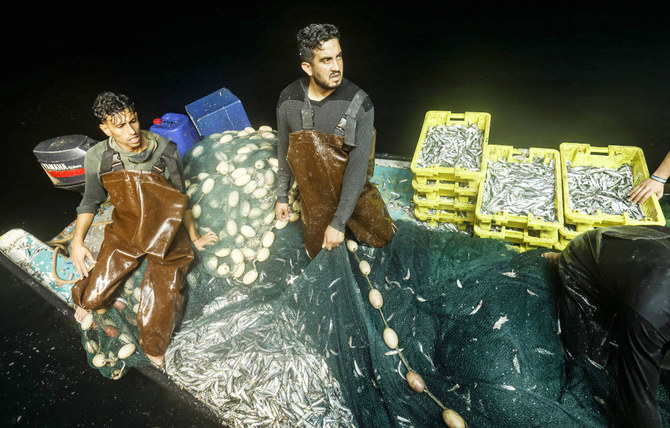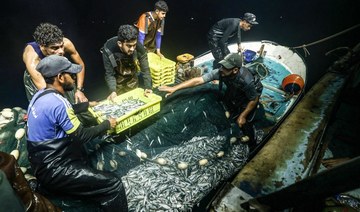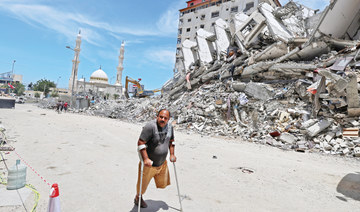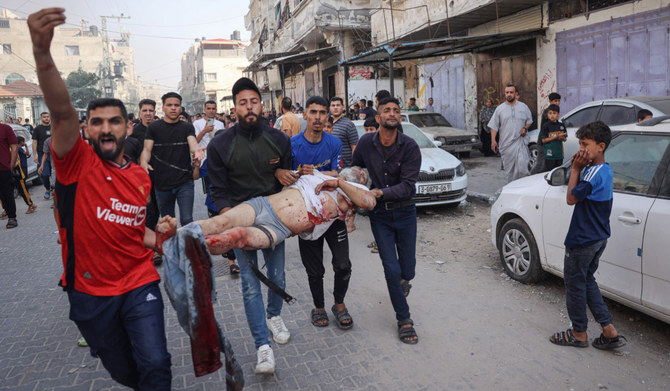GAZA CITY: The Gaza Strip might be off-limits for foreign foodies but the coastal Palestinian enclave is brimming with seafood restaurants, many owned by one local family whose culinary hook is their matriarch’s spicy fish tajine.
Munir Abu Hasira arrives at the Gaza port’s fish market at daybreak, but holds back as traders snatch up sardines and other fish caught during the night.
He is angling for more discerning catches like grouper, sea bream and large shrimp, which can go for around 70 shekels ($22) a kilo — a small fortune in the impoverished enclave, under Israeli blockade since 2007.
“It’s expensive because of the economic situation, but we buy the fish to supply restaurants and to export” to the occupied West Bank, he says, as workers pile fresh fish into a van.
For decades, the Abu Hasira family were fishermen, but since opening their first restaurant in the 1970s, they have gradually traded their fishing kit for chef’s tools.
Gaza fishermen say they struggle to eke out a living, snared by Israeli restrictions on the enclave’s fishing zone and on importing equipment into the enclave, from boat motors to sonar devices for finding shoals.
Problems like overfishing and pollution blight the local industry.
Some 4,200 tons of fish and seafood were netted from Gaza’s waters last year, according to the Israeli authorities. Just 300 tons were exported to the West Bank.
Sitting on a chair in a Gaza courtyard, Eid Abu Hasira, in his 80s, said he was the last of the family’s fishermen.
“I sold everything in 2013,” said the head of the family, sporting a white moustache and wearing a traditional robe and headdress.
“Today, we are in the fish trade, and have 13 Abu Hasira restaurants,” he said, clutching Muslim prayer beads as he leaned on a wooden cane.
One of his ancestors was a prominent Jewish Moroccan rabbi, who died during a trip to Egypt in the 19th century.
A descendent in Egypt had a vision that “they had to go to Gaza,” Eid Abu Hasira said.
“So we came here. My grandfather chose to live off the sea,” he said, adding that a Jewish branch of the family lives in Israel, while those in Gaza are Muslim.
As a young boy, his mother would cook up a seafood tajine that has become the Abu Hasira family chain’s signature dish.
Moeen Abu Hasira, 56, paid homage to his family’s culinary heritage, from their signature shrimp and tomato tajine, known as “zibdiyit,” to a fish tajine made with tahini, herbs and pine nuts, to grilled grouper.
“The secret of Gaza cuisine is strong chili,” he said from the kitchen of his restaurant, which he opened earlier this year.
The Abu Hasira family’s clientele has changed over time.
“Until the start of the first intifada, our restaurants were packed. Israelis came to eat here and so did tourists,” Moeen Abu Hasira said, referring to the first Palestinian uprising in 1987.
Since the Israeli blockade began in 2007 after the Islamist group Hamas took control of the enclave, few international tourists, foodies or gastronomic guide writers have visited.
Now, the family’s restaurants cater to a well-off Palestinian clientele, but Moeen Abu Hasira said times were hard as unemployment in Gaza hovers around 50 percent.
“Nobody will give you a star” in recognition of your restaurant, said the chef, who trained in French cuisine in a restaurant in the Israeli city of Jaffa.
“We did not learn in cooking schools or universities. There is none of that in Gaza,” he said. “We all learn from each other.”


























